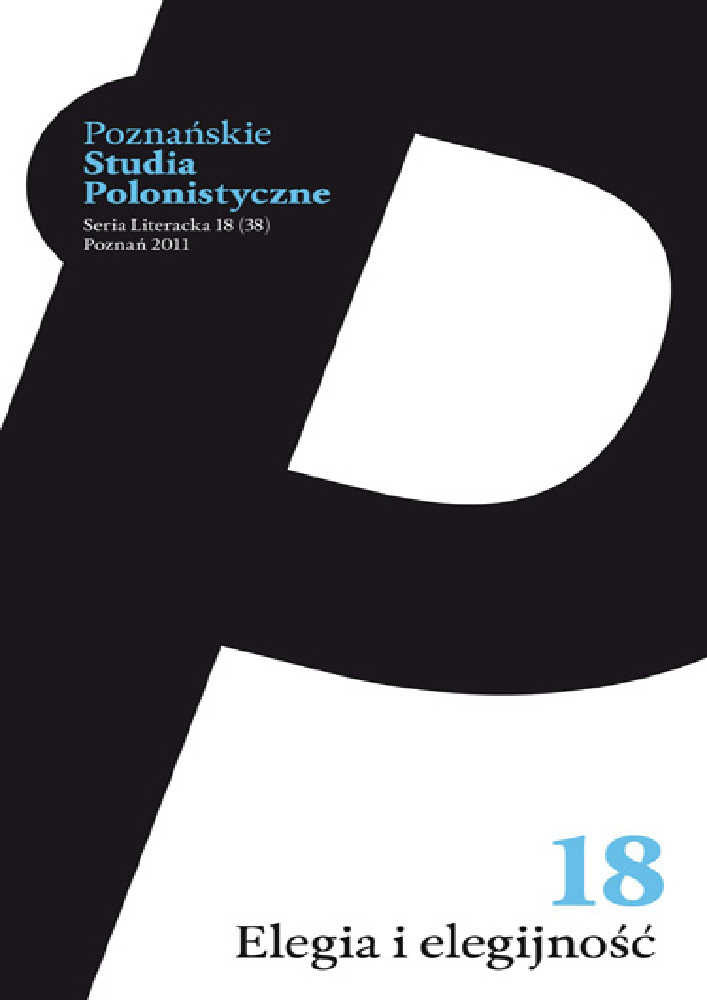Abstrakt
In his piece, the author of the article ponders on the experience of loss in human life. It is this particular experience, as well as the accompanying longing, that form the basic components of an elegiac attitude. However, in its broader sense, loss becomes one of the most universal experiences in literature and the arts of the twentieth century. After all, they shared the conviction that reality, no matter how looked upon, was never fully accessible to us and that man always played a losing game with it. Contrary to outward appearances, the above also applies to the creators of avant-garde movements. An analysis of the poem Do NN***, written by Miron Białoszewski, carried out first within the context of elegy and then with reference to the techniques and the program of cubism, makes us aware that Białoszewski somehow evades both elegiac mood and the avant-garde principles such as they are underlined in its program. The driving force for his writing is then curiosity. And it is curiosity, and just curiosity, independent and one that cannot be reduced to just the desire to know, that forms the only real alternative that, in a way, always remains metaphysical.Bibliografia
Artyści o sztuce. Od van Gogha do Picassa, wybór, oprac. E. Grabska, H. Morawska, Warszawa 1963.
Białoszewski M., Do NN***, w: Obroty rzeczy. Wiersze, Warszawa 1956.
Heidegger M., Bycie i czas, przeł. B. Baran, Warszawa 1994.
Heidegger M., Czym jest metafizyka, przeł. K. Pomian, w: Budować, mieszkać, myśleć. Eseje wybrane, Warszawa 1977.
Licencja
Autorzy
Autorzy tekstów przyjętych do publikacji w czasopiśmie „Poznańskie Studia Polonistyczne. Seria Literacka” są zobowiązani do wypełnienia, podpisania i odesłania na adres redakcji umowy o udzielenie nieodpłatnej licencji do utworów, z zobowiązaniem do udzielania sublicencji CC.
Zgodnie z umową, autorzy tekstów opublikowanych w czasopiśmie „Poznańskie Studia Polonistyczne. Seria Literacka” udzielają Uniwersytetowi im. Adama Mickiewicza w Poznaniu niewyłącznej i nieodpłatnej licencji oraz zezwalają na użycie sublicencji Creative Commons Attribution-NoDerivatives 4.0 International (CC BY-ND 4.0).
Autorzy zachowują prawa do dalszego, swobodnego rozporządzania utworem.
Użytkownicy
Zainteresowani użytkownicy internetu uprawnieni są do korzystania z utworów opublikowanych od 2016 roku w „Poznańskich Studiach Polonistycznych. Serii Literackiej” pod następującymi warunkami:
- uznanie autorstwa – obowiązek podania wraz z rozpowszechnionym utworem, informacji, o autorstwie, tytule, źródle (odnośniki do oryginalnego utworu, DOI) oraz samej licencji;
- bez tworzenia utworów zależnych – utwór musi być zachowany w oryginalnej postaci, nie można bez zgody twórcy rozpowszechniać np. tłumaczeń, opracowań.
Do wszystkich tekstów opublikowanych przed 2016 r. prawa autorskie są zastrzeżone.
Inne
Uniwersytet im. Adama Mickiewicza w Poznaniu zachowuje prawo do czasopisma jako całości (układ, forma graficzna, tytuł, projekt okładki, logo itp.).
